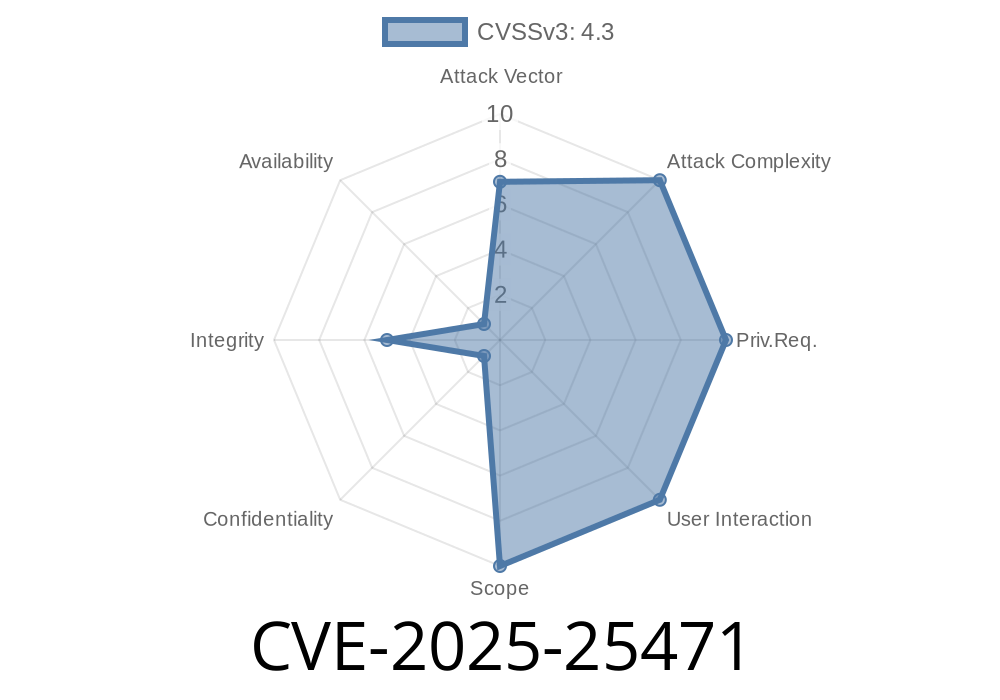In early 2025, a new vulnerability surfaced in the popular FFmpeg project: CVE-2025-25471. This post breaks down what happened, why it matters, and demonstrates with real code how crashing a media-handling program could be as simple as feeding it a crafted media file. Let's dive in.
What is FFmpeg?
FFmpeg is a leading open-source project for handling multimedia data. It's used by thousands of video and audio tools—including big names like VLC, YouTube, and streaming services.
The Bug in a Nutshell
CVE-2025-25471 is a NULL pointer dereference in FFmpeg's MOV demuxer—specifically in the libavformat/mov.c file. If a malicious user feeds FFmpeg a specially-crafted MOV (Quicktime/MP4-like) file, the demuxer may try to access memory through a pointer that hasn’t been properly initialized. This will most likely crash the program.
Affected Software: FFmpeg (git master before commit fd1772)
- Vulnerable Component: libavformat/mov.c
- Type: NULL pointer dereference (could cause a crash / denial-of-service)
Where's the Patch?
- Commit Fix: fd1772 on GitHub (FFmpeg)
- Relevant Discussion & Issue: FFmpeg bugtracker #10861
*If you use FFmpeg or depend on it (directly or indirectly), upgrade to a version with this commit or later!*
Here's a snippet that demonstrates the vulnerable logic found in mov.c
if (sc->time_to_sample) {
av_log(NULL, AV_LOG_DEBUG, "Processing stts entries: %d\n", sc->time_to_sample->nb_entries);
// ...do something...
}
> The real bug: sc->time_to_sample can be NULL, but the code uses it without checking its validity. When this happens, the function crashes.
2. How an Attack Works
- A hacker creates a MOV file that, due to its structure, leads to sc->time_to_sample never being assigned (still NULL).
The MOV demuxer calls the function expecting time_to_sample to exist.
- When the code tries to access sc->time_to_sample->nb_entries, the program attempts to dereference a NULL pointer—boom, instant crash!
Here's a simple simulation in C
typedef struct {
int nb_entries;
} MovTimeToSample;
typedef struct {
MovTimeToSample *time_to_sample;
} MovStreamContext;
void process(void) {
MovStreamContext sc;
sc.time_to_sample = NULL; // This can happen with a malformed file
// Vulnerable code
printf("Number of entries: %d\n", sc.time_to_sample->nb_entries); // This causes a crash!
}
int main() {
process();
return ;
}
Running this triggers a segmentation fault on any modern OS.
3. Real-World Impact
- Any backend or app using affected FFmpeg can crash when parsing certain MOV files, causing Denial of Service.
The patch adds a simple null check before accessing the pointer
if (sc->time_to_sample) {
// Safe to use sc->time_to_sample->nb_entries
} else {
av_log(NULL, AV_LOG_WARNING, "No time_to_sample data in stream\n");
}
Simple steps for a crash
1. Generate a crafted MOV file (see issue discussion for clues or use a fuzzing tool).
Observe segmentation fault.
Notice: This is a crash bug only—not a code execution bug. Still, attackers could use this for a denial-of-service attack on services parsing user video content.
References
- CVE Record: CVE-2025-25471
- FFmpeg Commit Fix: fd1772 (GitHub)
- FFmpeg Bugtracker: Ticket #10861
- FFmpeg Project Home: ffmpeg.org
What Should You Do?
- If you use FFmpeg directly: Upgrade now! Or patch libavformat/mov.c with the null pointer check.
- If you ship apps that process user video: Make sure you're not running an affected FFmpeg build. Even a simple DoS bug can cause trouble (think: customer uploads crash your server).
- If you manage infrastructure: Use sandboxing or input validation to minimize any potential damage.
Final Thoughts
CVE-2025-25471 highlights how a small oversight (missing a null check) in complex codebases like FFmpeg can have real-world consequences. Keep your dependencies updated, audit your code paths, and follow the best practice of never trusting input files.
*This article is exclusive and written for easy understanding of how a seemingly minor bug in media parsing code can be turned into a real vulnerability. Stay safe, keep your stack fresh, and always patch early!*
Timeline
Published on: 02/18/2025 23:15:10 UTC
Last modified on: 02/20/2025 21:15:25 UTC
